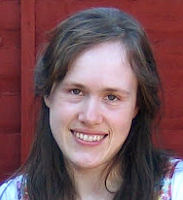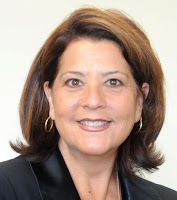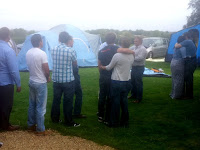 Today we have a guest post from Rhoda Pickens, who blogs from Wales in the UK at 'Living to please God'.
Today we have a guest post from Rhoda Pickens, who blogs from Wales in the UK at 'Living to please God'.She brings us some great thoughts about how we can discover our role and function in the body, and how we can be more sure about it. Do you ever wonder, 'Am I living the life the Lord wants for me?' Rhoda investigates some useful pointers that help us examine ourselves and find a secure sense of direction.
How Do We Know What We Are Called To Do? - Rhoda Pickens
We all have things that God wants us to do, but how do we know what?
‘For we are His workmanship, created in Christ Jesus for good works, which God prepared beforehand that we should walk in them.’ (Ephesians 2:10)
There are some callings that we all have as Christians:
- To seek God’s glory (1 Corinthians 10:31)
- To seek to become more like Christ (Matthew 6:33)
- To seek the furtherance of Christ’s kingdom here on earth (Matthew 6:33, Matthew 28:19)
- To disciple others and teach them more about Him (Matthew 28:19,20)
- We should aim to be ‘fruitful in every good work’ (Colossians 1:10)
But there does seem to be a pattern in the Bible of some people being specifically called to certain things, for example when He said to Abram to leave his country and family and to go where He told him.
It doesn’t record this of everyone though, so I don’t think everyone should necessarily seek a specific life calling. But I believe there are things that God has set aside for us to do so we should be praying that God would lead us to those things.
An area where I do believe we need to seek a call also, is for full time ministry. When we are in the trenches we want to know that God called us to be there so that we don’t go running home. Also we want to know God will provide our needs because He has called us to do that work.
How do we know what God might be calling us to? - Here are a few thoughts on this, though there may well be more to it than I have mentioned!
Look at your gifts - The Bible tells us to use our gifts, so if we are gifted in a certain area, at least spiritually anyway, then we should look for opportunities to use them. This may well lead you eventually to an area that God is calling you to work in.
‘As each one has received a gift, minister it to one another, as good stewards of the manifold grace of God.’ (1 Peter 4:10)
Be willing to do what He wants you to do - It is all very well asking God to show you what He wants you to do, but if you’re not willing to do it then there may not be much point in Him telling you!
Isaiah’s call is often quoted in the Bible, but it starts not with God calling Him specifically, but asking openly, “Who will go for Us?” and then Isaiah says “Here am I! Send me.” (Isaiah 6:8) Isaiah was obviously willing and available to do what God was wanting done.
Ask God what He wants you to do - This may sound obvious, but often people don’t really take the time to pray about what God is wanting them to do with their lives. I know I didn’t until I was in the second year of university and I started feeling restless and then I started praying. Before that I was just headed in the direction of the combination of my parent’s and my decision making.
‘If any of you lacks wisdom, let him ask God, who gives generously to all without reproach, and it will be given him.’ (James 1:5)
A few tips for asking God:
- Retreat - Try to get away from daily life to spend time with God. It is often when you are out on a long walk or up on the mountain side like Jesus, or at a retreat, that you can understand more how God is leading you.
- Read the Bible – it is God’s word, so if we want to find His will we should definitely be reading it, and asking God to speak to us!
God may work through your desires - Often God will give you a burden for a specific people or place, or make you feel restless. I wouldn’t use this alone to guide me, but it can be a way that God prods you, like Nehemiah who sat down and wept when he heard that the wall of Jerusalem was broken down and its gates burnt with fire. That eventually led to him going back there to lead the rebuilding.
I think you do need to be careful with this one though, as your desires can also lead you the wrong way!
Give it time - Jim Elliot spent several years seeking direction from God before he finally had the peace he wanted about knowing that tribal work in South American jungles was his general purpose. It can take time.
Don’t think about your ability or lack of it - I love what Chuck Smith says, that God doesn’t want your ability, but your availability. He will provide all we need, just like He did with Jeremiah:
“Do not say, ‘I am a youth,’ for you shall go to all to whom I send you, and whatever I command you, you shall speak. Do not be afraid of their faces, for I am with you to deliver you.” (Jeremiah 1:7-8)
Godly counsel - Just like with all guidance, godly counsel is very useful. Again we have to be careful with this one because well meaning Christians can try to persuade us away from what God is calling us to do! Try to find someone who has surrendered themselves, is serving God wholeheartedly and has some experience in the faith.
I liked what Pete Fleming said: ‘I think a call to the mission-field is no different from any other means of guidance, a call is nothing more or less than obedience to the will of God, as God presses it home to the soul by whatever means He chooses’
And I think that if you are really wanting to do God’s will, and persevere in prayer, then He will show you what He is calling you to – though it may take more time than you thought!
Questions:
- Are you clear about he Lord's calling on your life or are you just drifting?
- In your circumstances, which of Rhoda's points did you find most helpful?
- Will you be putting these ideas into practice? If so how and when?
See also:
- Do you need a new vision? - Missional challenge
- How do you know if God is speaking? - Release the APE
- How to find the promised land - UnTangled
- Like a torch - Journeys of heart and mind
- Living to please God
- Thoughts on new year's resolutions - Living to please God
- Wishing our lives away - Rethinking faith and church





